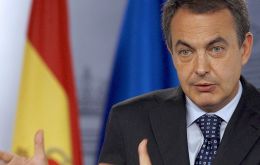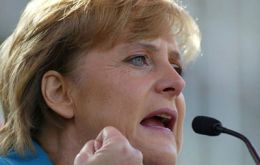MercoPress. South Atlantic News Agency
Tag: Eurozone
-
Saturday, May 8th 2010 - 06:06 UTC
Spain Emerges from Two-Year Recession with More Doubts than Certainties

Spain’s economy emerged from an almost two-year recession in the first quarter, trailing the Euro area by six months. GDP expanded 0.1% in the first three months of 2010, the Madrid-based Bank of Spain estimated in its monthly report today.
-
Saturday, May 8th 2010 - 01:42 UTC
EU Full Support for Euro (and Greece) to Fight Contagion: Creates Stabilization Mechanism

Leaders of the 16 EU member states that use the Euro have approved a 110 billion Euro loan to Greece to prevent its debt crisis from spreading. European Commission President José Manuel Barroso said the Eurozone would do whatever it took to safeguard Greece's financial stability. In return for the three-year loan, Athens must cut public spending.
-
Friday, May 7th 2010 - 05:36 UTC
Greek Default “Is Not an Option” and “Never Has Been” Says IMF

A default by Greece on its debt obligations is not and has never been an option, a spokeswoman for the International Monetary Fund (IMF) said on Thursday. A Greek “default is not on the table, has not been on the table” insisted IMF director of external relations Caroline Atkinson.
-
Friday, May 7th 2010 - 05:33 UTC
ECB Leaves Euro Policy Unchanged; European Leaders Set to Approve Greek Rescue

European Central Bank president Jean-Claude Trichet faced down pressure for new moves to shore up the weakest Eurozone countries, but kept options open even as he said Spain and Portugal were “not Greece”.
-
Friday, May 7th 2010 - 00:47 UTC
Greek Contagion Threatens South Europe and UK Banks Warns Rating Agency

Banks in the United Kingdom and Europe risk their credit ratings being damaged because of “contagion” from Greece's debt crisis, a ratings agency has warned. Moody's said banking systems faced “very real, common threats” if doubts were raised about their governments' abilities to pay debts. It referred specifically to UK, Irish, Italian, Portuguese and Spanish banking systems.
-
Wednesday, May 5th 2010 - 06:35 UTC
Greek Aid Package Hard to Sell: Stock Markets World Wide Fall Sharply

Stock markets fell sharply Tuesday as concerns about high levels of European government debt continue to shake investor confidence. The Euro fell to a 13-month-low against the dollar, dropping to 1.3004, after earlier slipping below the 1.30 mark.
-
Tuesday, May 4th 2010 - 05:48 UTC
European Central Bank Beefs Greek Rescue-Plan; Takes “Junk” Bonds as Collateral

The European Central Bank (ECB) has moved to shore up the €110 billion EU/IMF rescue of Greece by offsetting the impact of the “junk” rating on the country’s debt.
-
Tuesday, May 4th 2010 - 05:29 UTC
German Cabinet Approves Contribution to Greek Bail Out

Germany's cabinet has approved its contribution to the Eurozone and IMF bailout of Greece. The German parliament is set to pass the legislation later this week to allow its loan—worth 22.4 billion Euros over three years—to be paid.
-
Monday, May 3rd 2010 - 02:24 UTC
Euro Zone and IMF Agree to 110 Billion Euro Aid for Greece; Summit in Brussels

Euro zone members and the IMF have agreed to a 110 billion Euro (146.2 billion US dollars) three-year bailout package to rescue Greece's embattled economy. In return for the loans, Greece will make major austerity cuts which Prime Minister George Papandreou said involved “great sacrifices”.
-
Wednesday, April 28th 2010 - 18:18 UTC
IMF Warns of Greek Crisis Contagion; Germany Reluctant to Support Aid

The head of the International Monetary Fund has warned that the crisis in Greece could spread throughout Europe. Dominique Strauss-Kahn said that every day lost in resolving Greece's problems risks spreading the impact “far away”.
